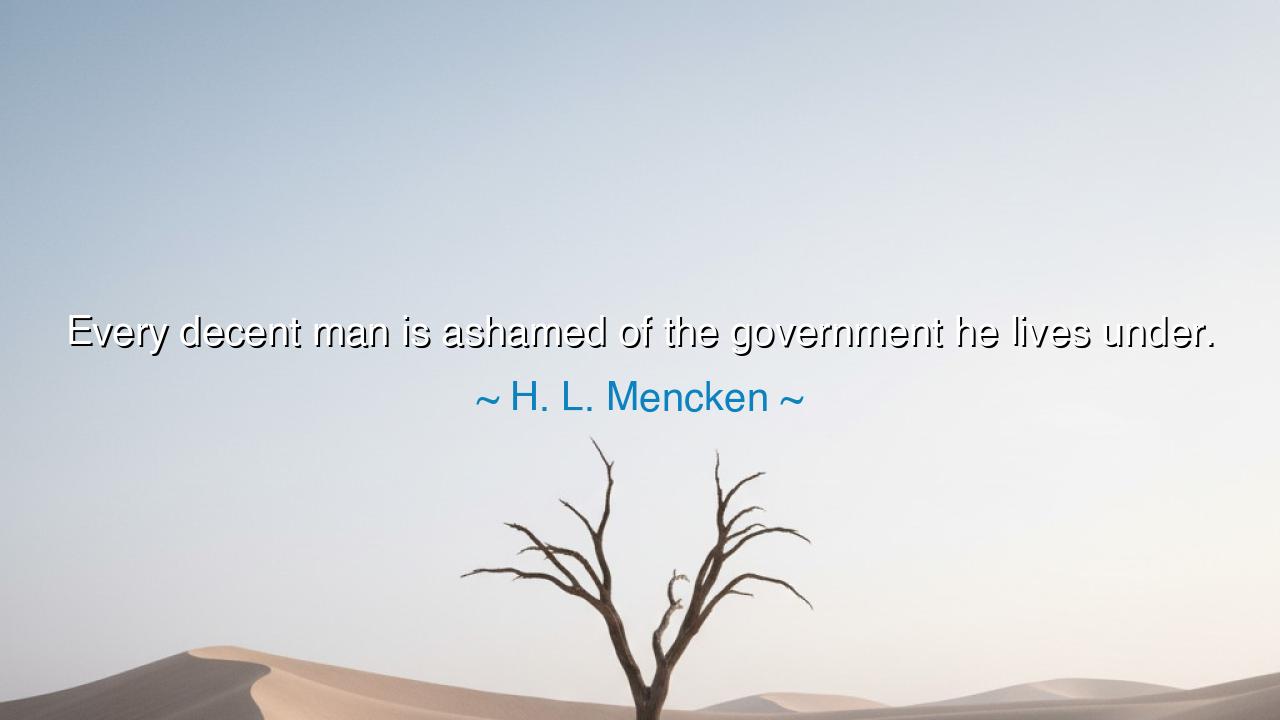
Every decent man is ashamed of the government he lives under.






The words of H. L. Mencken — “Every decent man is ashamed of the government he lives under.” — burn like an ember of truth buried in the ashes of history. In this sharp and piercing statement, Mencken, the relentless critic of hypocrisy and the fearless defender of reason, lays bare the eternal tension between conscience and authority. His words are not a condemnation of one nation alone, but of the nature of power itself — the tendency of governments, in every age and form, to betray the virtues they proclaim. And yet, behind his cynicism lies a deeper moral fire: that the decent man, the man of integrity and justice, must always hold power to account, and therefore, must always live with a measure of shame for the corruption and cruelty carried out in his name.
Mencken, the “Sage of Baltimore,” wrote these words in the early twentieth century — a time when the modern state had risen to immense power, waging wars abroad while promising liberty at home. He lived through the First World War, through censorship, through the rise of populism and political deceit. He saw politicians peddle moral virtue while profiting from vice; he watched the machinery of democracy grind down truth beneath the weight of greed and ignorance. His statement reflects not despair, but disillusionment born of love for reason and justice. To him, the tragedy of government was that it so often cloaked its failings in noble words — and that the masses, in their hunger for comfort, were too willing to believe.
To say that “every decent man is ashamed” is not to declare that patriotism is folly, but to remind us that true patriotism is not blind loyalty, but moral vigilance. The decent man, by his nature, cannot look upon injustice, corruption, or abuse of power without sorrow. He does not deny his nation — he grieves for it. His shame is not weakness, but wisdom: the recognition that even in the freest of lands, power tempts those who wield it to tyranny. Thus, Mencken’s words echo the ancient warning of philosophers — from Cicero to Confucius — that the moral health of a nation lies not in its laws, but in the virtue of its leaders and citizens.
History, like a mirror, reflects this truth again and again. Consider the Vietnam War, when countless young Americans, raised to believe in freedom, found themselves serving a government that lied to its people, waging destruction in the name of peace. Many who protested were branded as traitors, yet it was they — the “decent men” and women of conscience — who felt the weight of Mencken’s words most deeply. They were ashamed, not because they despised their country, but because they loved it enough to hold it to its highest ideals. Their shame became a form of honor — the seed of accountability from which reform would grow.
But Mencken’s words do not belong only to the past. They speak as loudly today as they did in his time, for power never ceases to corrupt, and governments never cease to fail those who trust them blindly. Whether through greed, injustice, or neglect, authority so often strays from the path of service into the valley of self-preservation. Yet the “decent man” — the citizen of conscience — must not despair. His shame must not harden into cynicism, but instead become the fuel of reform. To be ashamed of one’s government is not to reject it, but to demand that it live up to the promises it has made.
Indeed, the shame Mencken speaks of is the mark of a living conscience, the sign that a people have not surrendered to indifference. When citizens cease to feel shame at corruption, when they shrug at injustice or excuse deceit as “the way of the world,” then tyranny has already taken root. A free people must feel discomfort in the face of wrongdoing — for it is from that discomfort that courage and change arise. The prophets, the reformers, the revolutionaries of every age — all began in shame before they rose to action.
So let this be the teaching for every generation: never grow comfortable with the flaws of your government, for comfort breeds decay. To be decent is to care, to question, to demand better. Let your shame be tempered with hope, your criticism with purpose, your defiance with love of truth. Serve not the vanity of rulers, but the dignity of your fellow man. Stand as a mirror before power, even when it blinds you with its glare. For the day you feel no shame is the day you have lost your soul to complacency.
And thus, remember Mencken’s eternal wisdom: shame is the conscience of a free people. Let it live within you, not as bitterness, but as a holy fire — a reminder that liberty, once granted, must be guarded not by pride, but by humility. For though governments may rise and fall, the duty of the decent man endures: to speak truth to power, to demand justice without fear, and to keep alive the flame of conscience in a world forever tempted by corruption.






AAdministratorAdministrator
Welcome, honored guests. Please leave a comment, we will respond soon